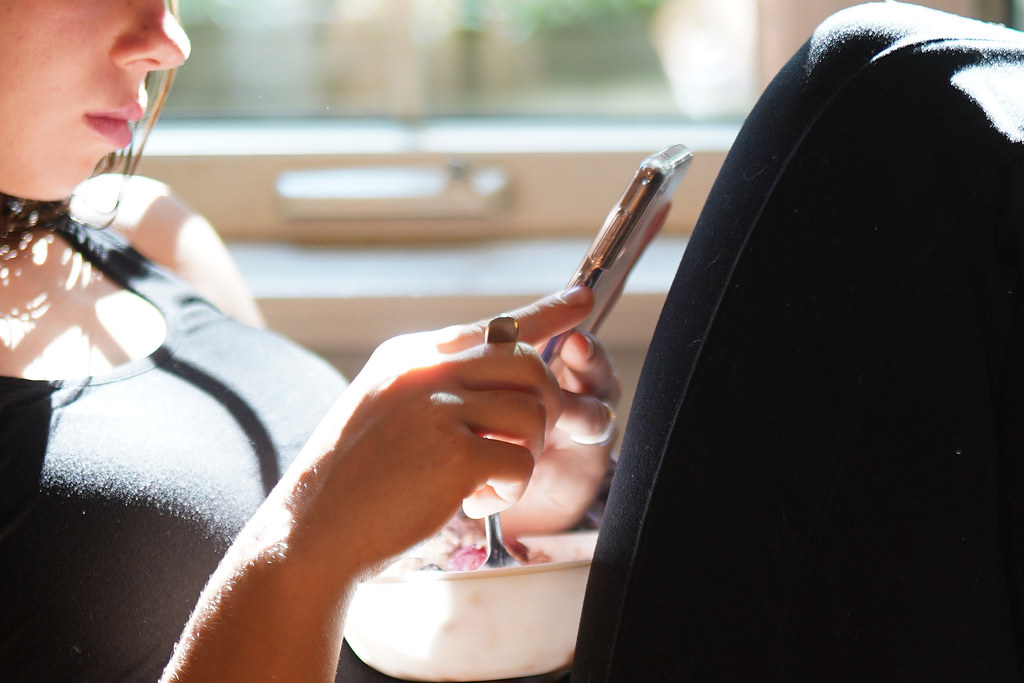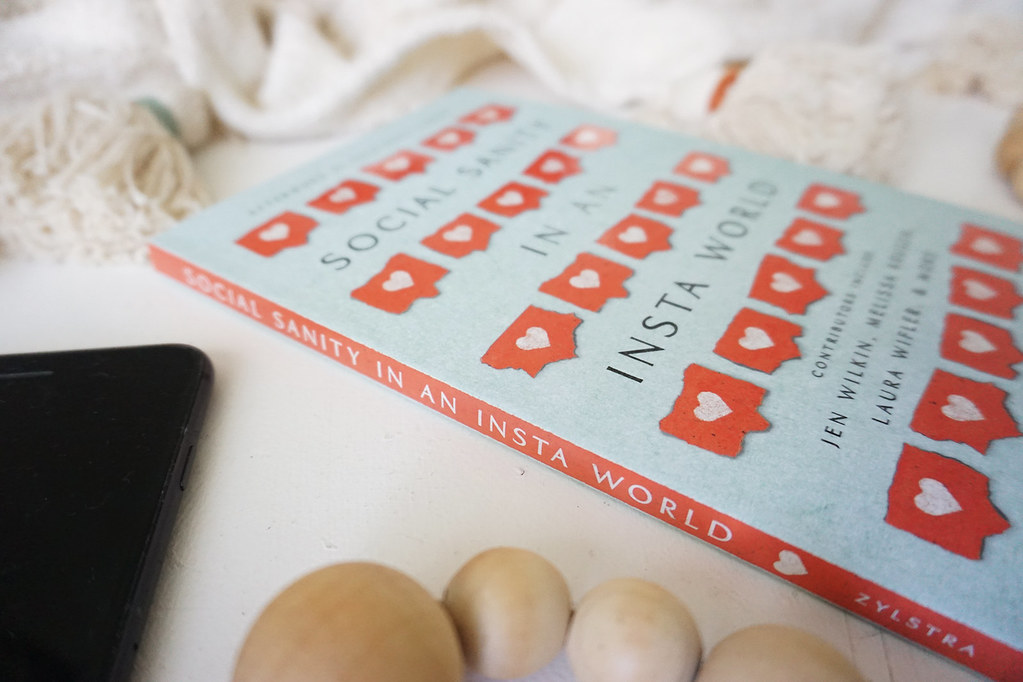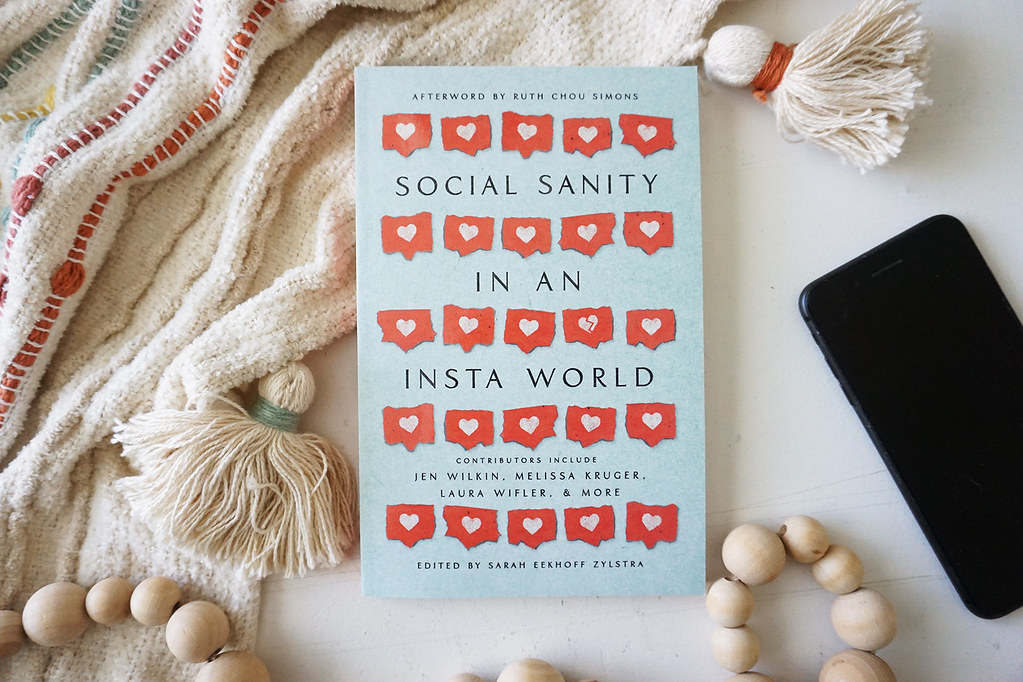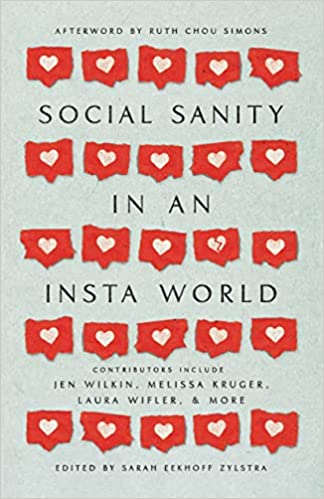Emily Jensen knows about social media—along with her sister-in-law Laura Wifler, she started the Risen Motherhood podcast a few years ago, and it has taken off. Emily’s had to manage a growing social media presence, both personally and professionally – so when she talks about her experiences online, I listen up. With wisdom and grace, she brings the gospel to bear on how we delight in – and, honestly, struggle with – platforms like Instagram and Facebook. It’s a beautiful grace to welcome Emily to the farm’s table today …
On October 4, 2021, Instagram, Facebook, and WhatsApp went down.
For six hours, users all over the world opened their apps and browsers to an error message—no new posts, no notifications, no messages. No ability to create, comment, or consume. For most of a Monday, billions of people had to find something else to do.
Shortly after the outage, the memes began rolling in. Pictures of people talking on the phone: “Instagram is down! Just describe your lunch to me!” Scenes of a beautifully advanced society with people enjoying life outdoors: “The world one week from now if Instagram and Facebook never got fixed.” And tweets from users lamenting social media’s presence, arguing that we’d all be better off if these platforms never came back online.
A forced social media break caused quite a stir, and the consensus was surprisingly clear—maybe we aren’t missing out on much. Maybe this was a much-needed break.








Have you ever longed for a break from social media?
After a pandemic, a heated political season, and the escalation of Christian division online, maybe you’re feeling fatigued. What was once a fun place to share pictures of your latte, your latest vacation, or your kids’ first day of school can now seem an anxiety-ridden battleground for your heart, your faith, and your allegiance to various ideologies.
What was once an opportunity to connect with friends and family, deepen relationships, and celebrate each other’s blessings now feels like a chance to witness each other’s pride and savvy sales tactics.
“Platforms like Instagram and TikTok provide information, entertainment, and a direct link to the lives of people you care about, but they also drown you with input, stimulation, and new things to worry about every minute of the day.”
Platforms like Instagram and TikTok provide information, entertainment, and a direct link to the lives of people you care about, but they also drown you with input, stimulation, and new things to worry about every minute of the day.
Where does that leave you? Should you keep using social media?
Several years ago, I took my first extended break from social media after noticing some concerning symptoms in my own life:
- My social media apps consumed an ever-increasing amount of time and attention. While I waited for things, I instinctively grabbed my phone to fill the seconds.
- It was tough to focus on and enjoy books or longer-form reading. I’d read a paragraph or two and catch myself skimming or letting my thoughts wander.
- It was hard to complete projects that required deep thought, problem-solving skills, or research.
- I often felt scattered and unable to complete daily tasks efficiently.
- Sometimes my mind was in a fog, processing dozens of thoughts but only scratching the surface of each one.
- I had low-level anxiety that wasn’t attached to a specific circumstance and felt dissatisfaction and overwhelmed with many aspects of life.
- Prayer, Bible study, and classic Christian writings were becoming less exciting and engaging than I remembered.
- My personal enjoyment of the outdoors and doing simple activities was diminished.
- I felt less creative and less excited about learning.
I didn’t know it at the time, but I was experiencing many of the common side effects of frequent social media use.
While it would be an oversimplification to say that social media was the direct cause of every item on this list, the connection was real. Many years later, after multiple month-long social media breaks—and another one that lasted nearly a year—I experienced a change.
Today, with the addition of new boundaries and habits, many of those symptoms are gone. I look back on that time and see that my brain and heart were struggling. I needed to mitigate the effects of social media in my life so I could serve Christ more faithfully and love others more fully.
It’s not that social media is all bad or should never be used, but each of us would benefit from evaluating our habits—making sure this technology is serving God’s greater purpose in our lives. As Paul said to the Corinthians, “‘All things are lawful for me,’ but not all things are helpful. ‘All things are lawful for me,’ but I will not be dominated by anything” (1 Cor. 6:12).
This is also true for social media. We must consider whether it’s mastering us, how it’s affecting our witness, and what it means to use it with wisdom.







There’s a popular influencer who’s been dubbed “Instagram’s Grandma.” She starts almost all her videos with the question, “Did your mom ever tell you . . . ?” and ends with something that my mom might have told me — but I was probably too young to care.
These days, I’m all ears for a mother’s (or grandmother’s) wisdom. And even though I’m not your mom, I want to tell you something you might need to hear. Ready for it?
“It’s OK to leave social media.”
It’s OK to leave social media.
Before you give me all of your “yeah buts,” just let that sit for a moment.
Today (or tomorrow or next week) you could log out of your accounts, delete the apps off your phone, disable your profiles, and just be done. For as long as you wanted to or needed to.
How does that thought make you feel? Terrified? Anxious? Excited? Relieved? And if you feel like you can’t take a break from social media, even for the weekend, why is that?
I realize that, logistically speaking, it might be a challenge. Maybe you manage the front-facing communication for your business or your job is to manage social media for another company.
Or perhaps you create content or products that benefit from being shared online.
This can make breaks and boundaries tricky, but taking a breather is still possible with planning.
Even if your income is tied to social media, you don’t have to be mastered by it. If you feel the need for a break, ask the Lord to give you creativity and wisdom to find a way off for a while.
But if your income is not tied to social media use, and it’s primarily for recreation, what’s stopping you? If you’d love a break or you daydream about a life without social media, why don’t you make it a reality? My guess is some form of FOMO is holding you back.
FOMO is normal. We’re hardwired for community, and we love knowing about, and being involved in, other people’s lives.
What if you miss cute pictures or don’t hear about the latest drama in the Christian world? What if you don’t hear a major piece of news or a local announcement that could affect your life? What if you miss a chance to build relationships, gain a following, or share something relevant?
“Somewhere along the way, I stop experiencing social media FOMO and instead, I start having JOMO—the joy of missing out.“
FOMO can keep us hooked.
But what are we missing by never taking a break? During my social media sabbaticals, I’ve noticed changes in my mind and heart.
My creativity comes back. I get fresh writing ideas. My love for reading returns. I spend more time outdoors. I’m able to serve and care for my household more effectively and with an undivided heart.
Somewhere along the way, I stop experiencing social media FOMO and instead, I start having JOMO—the joy of missing out.
Maybe you’ve considered what you stand to miss, but have you considered what you stand to gain?

Author, podcaster, wife, and mama Emily Jensen lives in the cornfields of Iowa, where she and her husband are raising five children. She loves thinking about the way the gospel changes everything, from potty training to discipline to social media use. Emily is the coauthor of Risen Motherhood and a contributing author to the brand-new Social Sanity in an Insta World.
If you’re a woman with access to the internet, odds are you’ve got a social media account—or several. Social Sanity for the Insta World is a multiauthor book – contributors from Emily Jensen to Jen Wilkin to Ruth Chou Simons explain how we can use social media with wisdom and grace, giving glory to God while also guarding our hearts. This isn’t just a book about leaving social media (though that may be what you prayerfully decide to do for a season) — there are many benefits to sharing online, and most of us will keep our accounts active. Social Sanity helps us do that well bringing the gospel to bear on how we update, share, and post.
[ Our humble thanks to The Gospel Coalition for their partnership in today’s devotion. ]







